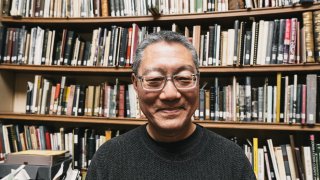
Tom Izu is a civil rights educator, community organizer and retired Executive Director of the California History Center at De Anza College.
Tom was raised in the South Bay and from an early age, he felt isolated and could not understand why. “Growing up here during that time there were very few Asians. Out of my graduating class, I think it was 400 and there were maybe seven Asian Americans. Even being called an Asian American was not typical. That was considered radical and odd.”
At the time, ethnic studies were not a part of the California Public School curriculum, so the opportunity to explore topics surrounding ethnicity or identity was never present until he became involved with the movement demanding reparations for Japanese Americans interned during World War II.
“It was a big battle just to get the Japanese American community to support it. But reparations is important and it’s in the Bill of Rights. If we don’t want the internment to happen to anybody else then we have to do something to help people. That really got them going and some became the most powerful advocates by telling these stories.” From gathering testimonials and support of other ethnic groups such as the African and Mexican American communities, reparations and education for the Japanese internment became legislation.
For Tom, protecting vulnerable minority groups facing what had historically happened to Japanese Americans during the internment were a top priority. When asked why organizing is so important, Tom explains “there are still a lot of things that aren’t resolved in our community. There are so many stories that have still yet to be uncovered, but it’s also a way to get my community to understand and have more empathy with other communities that are suffering similar injustices.”
Through education, we know to not make the same mistakes in our past. History also proves when all marginalized groups take a stand for one another, we all win.

